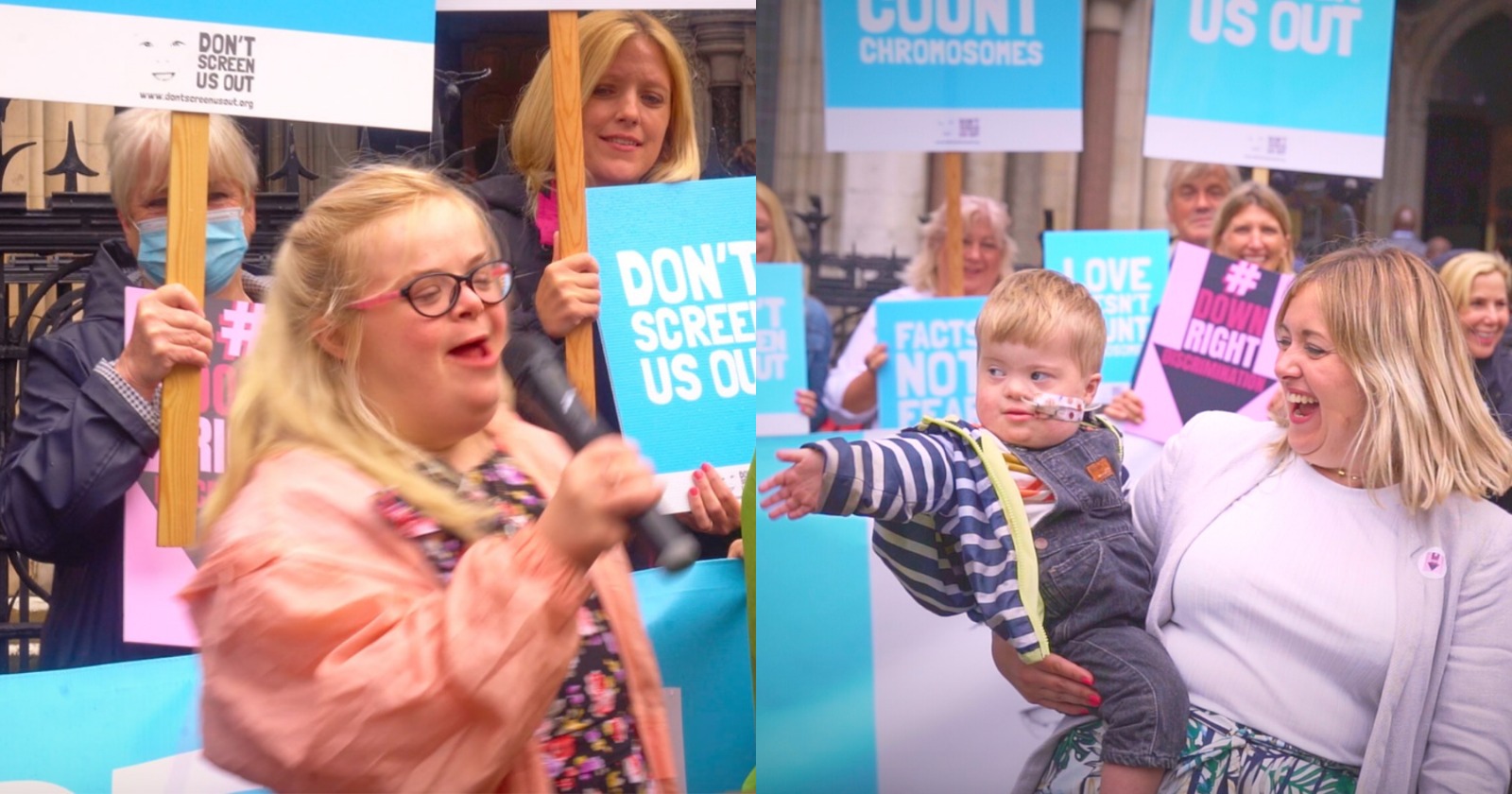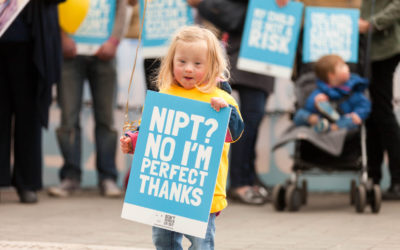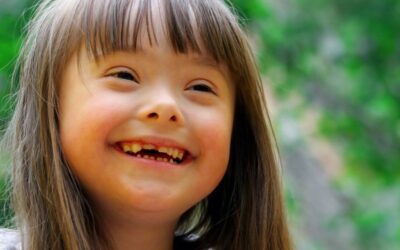PRESS RELEASE – FOR IMMEDIATE RELEASE
Woman with Down’s syndrome’s landmark case against UK Govt over discriminatory abortion law to go onto Court of Appeal
The women behind a landmark case against the UK Government over the current discriminatory abortion law that allows abortion up to birth for Down’s syndrome will seek permission for the case to be taken onto the Court of Appeal, after the High Court announced they have rejected the legal challenge.
Heidi Crowter, a 26-year-old woman from Coventry who has Down’s syndrome, together with Máire Lea-Wilson from Brentford, West London, whose two-year-old son Aidan has Down’s syndrome, are challenging the UK Government over a disability clause in the current law.
They have today announced that they will seek permission to appeal their case at the Court of Appeal.
BACKGROUND
Máire Lea-Wilson was placed under pressure to have an abortion when a 34-week scan revealed her son had Down’s syndrome.
Heidi and her team have crowdfunded over £100,000 for the case.
Currently in England, Wales and Scotland, there is a general 24-week time limit for abortion, but if the baby has a disability, including Down’s syndrome, cleft lip and club foot, abortion is legal right up to birth.
There were 3,083 disability-selective abortions in 2020. 693 of these abortions were due to babies being diagnosed with Down’s syndrome, an increase of 5.64% from 656 in 2019. The actual figures are likely to be much higher – a 2013 review showed 886 fetuses were aborted for Down’s syndrome in England and Wales in 2010 but only 482 were reported in Department of Health records. The underreporting was confirmed by a 2014 Department of Health review.
The UN Committee on the Rights of Persons with Disabilities has consistently criticised countries that provide for abortion on the basis of disability.
The Committee on the Rights of Persons with Disabilities’ concluding observations on the initial report of the United Kingdom of Great Britain and Northern Ireland made a key recommendation that the UK change its abortion law so that it does not single out babies with disabilities. The Government has decided to ignore this recommendation.
The Disability Rights Commission (now the Equality and Human Rights Commission) has said that this aspect of the Abortion Act “is offensive to many people; it reinforces negative stereotypes of disability…[and] is incompatible with valuing disability and non-disability equally”.
The 2013 Parliamentary Inquiry into Abortion for Disability found the vast majority of those who gave evidence believed allowing abortion up to birth on the grounds of disability is discriminatory, contrary to the spirit of the Equality Act 2010 and that it affects wider public attitudes towards discrimination. The Inquiry recommended Parliament reviews the question of allowing abortion on the grounds of disability and should consider repealing section 1(1)(d) of the Abortion Act which allows for it.
Disabled peer Lord Shinkwin proposed a Bill in the House of Lords that would have repealed section 1(1)(d) of the Abortion Act – the Bill was undefeated but unfortunately ran out of time. The Bill was supported by Disability Rights UK.
Boris Johnson’s Government introduced new abortion regulations to Northern Ireland last March. The regulations that the Northern Ireland Office introduced allow abortion up to birth for disabilities including Down’s syndrome, cleft lip and club foot. 1,875 people with Down’s syndrome and their families signed a letter to Boris Johnson urging him to ensure that selective abortion for Down’s syndrome was not introduced to Northern Ireland. Westminster recently approved regulations that give the Secretary of State, Brandon Lewis, power to compel the Northern Ireland Executive to commission full abortion services across Northern Ireland.
Polling has shown that the majority of people in England, Wales and Scotland feel that disability should not be a grounds for abortion at all, with only one in three people thinking it is acceptable to ban abortion for gender or race but allow it for disability.
Heidi and her legal team have set up a CrowdJustice crowdfunding page to help raise funds for legal proceedings, pay for legal advice and prepare for the case. To find out more and to make a contribution to the next stage of the case visit:www.crowdjustice.com/case/downrightdiscrimination/
Heidi Crowter, from Coventry, who has Down’s syndrome said:
“I am really upset not to win but the fight is not over.
The judges might not think it discriminates against me, the government might not think it discriminates against me but I am telling you that I do feel discriminated against….and the verdict doesn’t change how I and thousands in the Down’s syndrome community feel.
We face discrimination every day in schools, in the work place and in society. And now thanks to this verdict the judges have upheld discrimination in the womb too. This is a very sad day but I will keep fighting.
Thank you to my amazing friend Paul Conrathe and his team for their work on this case. Thank you to my mum and James for supporting me and for all in the DS community who have supported me and Aidan.
I am not giving up! Let’s do this!!”
Ms Lea-Wilson, 33, an accountant from Brentford, West London and mother to Aidan who has Down’s syndrome said:
“I am a mother, and I love and value my two boys equally. Today’s High Court judgement effectively says that my two sons are not viewed as equals in the eyes of the law and I am incredibly sad and disappointed that the court has chosen not to recognise the value and worth of people with Down syndrome, like my son Aidan.
People with Down syndrome face discrimination in all aspects of life, with the covid pandemic really shining a light on the dangerous and deadly consequences this can have. This ruling condones discrimination, by cementing the belief in society that their lives are not as valuable as the lives of people without disabilities.
I am surprised and disappointed to see that the ruling gave very little consideration to the feelings of people with Down syndrome and how section 11d of the abortion act has a very real and painful impact on their self worth and mental health. The judgement also gives very little consideration to the fact that many women, like myself, are pressured to abort much wanted pregnancies at such a late stage in the context of fear and misinformation which is given to them.
I do not regret bringing this case, because I believe it has helped raise awareness around the wonderful lives people with Down syndrome and their families lead, and helped dispel some of the negative, outdated and prejudicial attitudes that are prevalent in society and the medical profession. As Aidan’s mother, I will continue to fight for his rights, and look to appeal this judgement, because equality should be for everyone regardless of the number of chromosomes they have.”
Paul Conrathe, solicitor at Sinclairslaw who is representing Heidi and Máire said:
“This is a disappointing judgement that is out of step with modern attitudes to disability. As long ago as 2001, the Disability Rights Commission stated that the abortion legislation “is offensive to many people; it reinforces negative stereotypes of disability.
The judgement fails to recognise the damaging impact UK abortion legislation has upon the mental health and wellbeing of people with downs syndrome. By allowing babies with Downs Syndrome to be aborted up to birth, unlike neurotypical babies, the law sends a powerful message that the lives of people with Downs Syndrome are of lesser value.
My clients will be seeking permission to appeal to the Court of Appeal. “
Lynn Murray, spokesperson for Don’t Screen Us Out and mother of Rachel who has Down’s syndrome, said:
“It’s inspiring to see that Heidi and Máire are now planning on taking this case to the Court of Appeal.
By stating that disability is grounds for termination, section 1(1)(d) of the Abortion Act, promotes inequality and perpetuates negative stereotypes.
The provision in the Abortion Act harks back to a time when we thought it was better for people with disabilities not to be part of our society. We’re a far more progressive society now, we realise that diversity is healthy, and all of our laws should reflect that.”
ENDS
- For more information on the Don’t Screen Us Out campaign, see our website www.dontscreenusout.org or email info@dontscreenusout.org
- For interviews, contact Don’t Screen Us Out spokesperson Lynn Murray on 07840 966 736 or email info@dontscreenusout.org
- Heidi’s Facebook page:
- Previous news coverage featuring Heidi Crowter:
- https://www.telegraph.co.uk/news/2020/10/18/woman-downs-syndrome-says-better-dead-eyes-law-ahead-legal-challenge/
- Sky News – https://www.youtube.com/watch?v=Qz0pU7TKqb0
- https://www.dailymail.co.uk/news/article-8351603/Woman-Downs-Syndrome-launches-legal-bid-end-abortion-discrimination.html
- Victoria Derbyshire Show – https://www.youtube.com/watch?v=eeNuWj3xhbM
- Channel 5 News – https://www.youtube.com/watch?v=eeNuWj3xhbM
- https://www.theguardian.com/society/2018/dec/03/my-life-is-just-as-important-as-everybody-elses-meet-the-disability-leaders
- https://www.bbc.co.uk/news/av/45790521/the-23-year-old-busting-myths-about-down-s-syndrome
- https://www.itv.com/news/central/2019-03-21/he-makes-me-the-happiest-girl-in-the-world-twenty-three-year-old-with-downs-on-her-love-life-and-work-wouldntchangeathing-downs-syndrome-world-downs-syndrome-day/
- https://www.huffingtonpost.co.uk/entry/having-downs-syndrome-doesnt-make-me-less-of-a-person_uk
- https://www.dailymail.co.uk/video/news/video-1318649/Heidi-Crowter-s-powerful-s-Syndrome-message-Jeremy-Hunt.html
- Down’s syndrome abortion figures are expected to increase as NIPT is rolled out across hospitals on the NHS. The number of babies born with Down’s syndrome has dropped by 30% in NHS hospitals that have introduced the new test.



